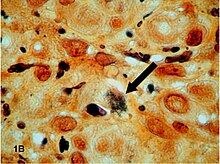Warthin–Starry stain
Appearance
(Redirected from Warthin-Starry)


The Warthin–Starry stain (WS) is a silver nitrate-based staining method (a silver stain) used in histology. It was first introduced in 1920 by American pathologists Aldred Scott Warthin (1866–1931) and Allen Chronister Starry (1890–1973), for the detection of spirochetes.[1][2] It has been considered a standard stain for the detection of spirochetes,[3] and is also used to stain Helicobacter pylori, Lawsonia intracellularis,[4] Microsporidia,[5][6] and particulates.[7] It is also important for confirmation of Bartonella henselae, a causative organism in cat-scratch disease.
Warthin–Starry stains organisms dark brown to black, and the background light golden brown/golden yellow.[5]
See also
[edit]References
[edit]- ^ "Warthin-Starry stain". Merriam-Webster's Medical Dictionary. Retrieved 2009-09-04.
- ^ Warthin, AS; Starry, AC (1920). "A more rapid and improved method of demonstrating spirochetes in tissues (Warthin and Starry's cover-glass method)". American Journal of Syphilis. 4: 97–103.
- ^ "Special Stains in Histology". The Internet Pathology Laboratory. University of Utah Spencer S. Eccles Health Sciences Library. n.d. Retrieved 2009-09-04.
- ^ Huerta, B.; Arenas, A.; Carrasco, L.; et al. (Aug 2003). "Comparison of diagnostic techniques for porcine proliferative enteropathy (Lawsonia intracellularis infection)". Journal of Comparative Pathology. 129 (2–3): 179–185. doi:10.1016/S0021-9975(03)00030-6. ISSN 0021-9975. PMID 12921724.
- ^ a b Field, A. S.; Marriott, D. J.; Hing, M. C. (1993). "The Warthin-Starry stain in the diagnosis of small intestinal microsporidiosis in HIV-infected patients" (PDF). Folia parasitologica. 40 (4): 261–6. ISSN 0015-5683. PMID 7516907.
- ^ Słodkowicz-Kowalska, A (2004). "Laboratory diagnostics of human microsporidiosis" (Free full text). Wiadomosci parazytologiczne. 50 (4): 679–89. ISSN 0043-5163. PMID 16862802.
- ^ Liu, H. (2008). "Warthin-starry Silver Method Showing Particulate Matter in Macrophage1". Biomedical and Environmental Sciences. 21: 85–9. doi:10.1016/S0895-3988(08)60011-2. PMID 18478983.
External links
[edit]
